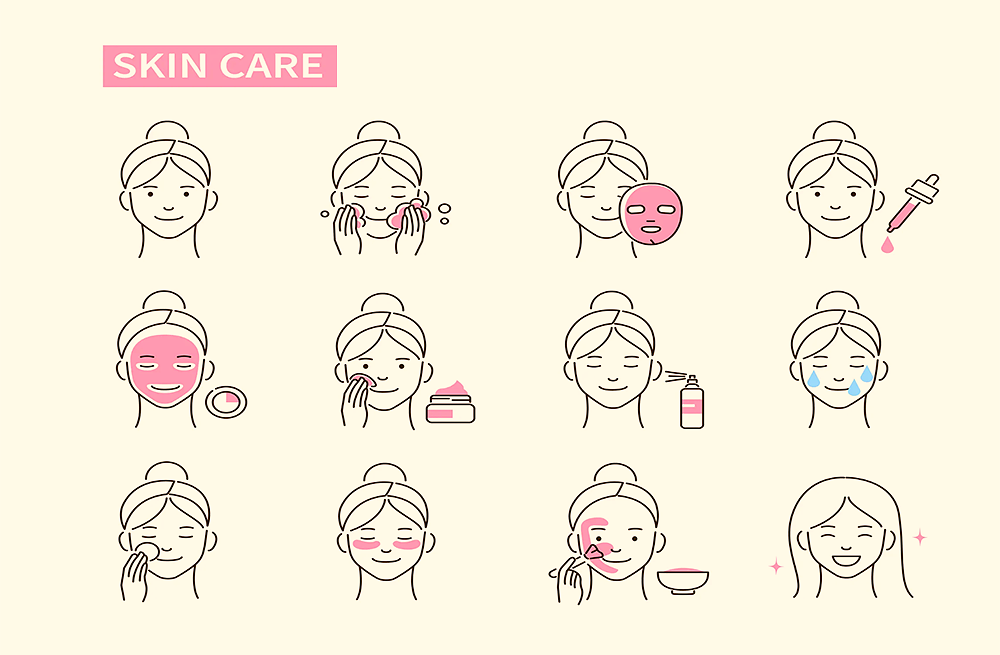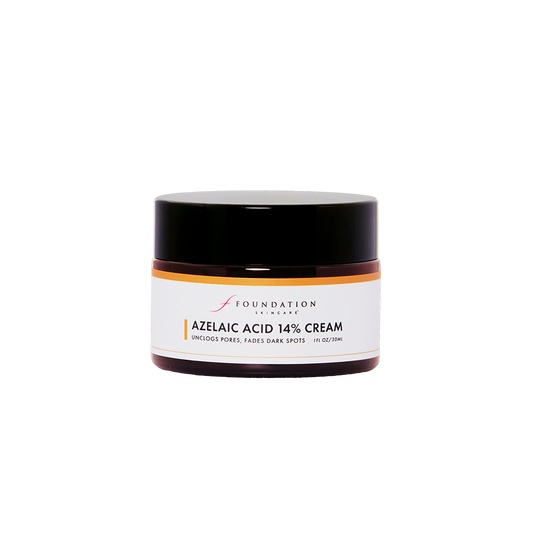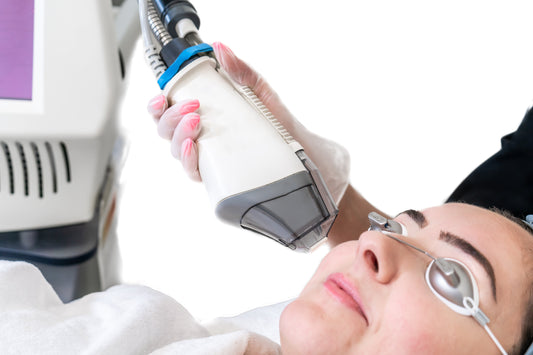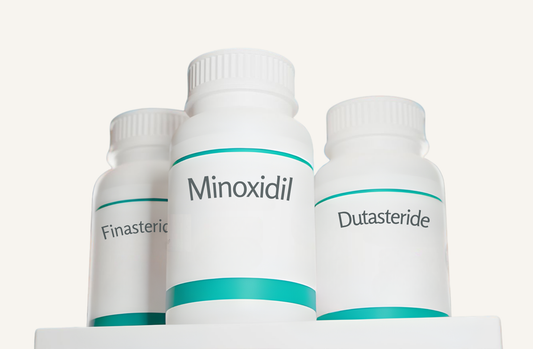As the largest organ of your body, your skin deserves a dedicated and adaptive approach to maintain its health and youthfulness.1 In this guide, we'll explore the basics on building a skincare regimen, delve into the factors influencing your skin, and provide insights into recognizing when it's time to switch up your routine. Understanding your skin type, adapting to age-related changes, and assessing your current regimen are crucial steps for maintaining healthy and radiant skin.
What is a Skincare Regimen?
A skincare regimen is a personalized routine aimed at nourishing and protecting your skin. It involves a series of steps and products tailored to your skin's unique needs. From cleansing and moisturizing to targeted treatments, a well-crafted regimen can enhance your skin's health and appearance when practiced consistently.
A skincare regimen may include the following steps:
- Cleansing
- Using a toner
- Exfoliating
- Using targeted serums like those containing retinol, niacinamide, or vitamin C
- Applying an eye cream
- Moisturizing
- Applying SPF
Factors that Affect the Nature of Skin
From genetics to lifestyle choices, various factors affect the nature of your skin. Understanding how these elements interact is key to formulating an effective and sustainable skincare routine.
Factors that affect the nature of skin include:
- Genetics: Your genetic makeup plays a significant role in determining your skin type and your susceptibility to certain conditions, such as hyperpigmentation 2and acne.3 There is also evidence that some aspects of aging can be attributed to genetics, as hydration levels tend to vary by ethnicity, and certain gene mutations can affect protein synthesis.4
- Environmental influences: External factors such as sun exposure, pollution, climate, and humidity impact the condition of your skin. UV rays, in particular, can cause premature aging and increase the risk of hyperpigmentation and other skin issues.
- Lifestyle choices: Lifestyle habits like diet, hydration, smoking, and alcohol consumption can all affect skin health. A balanced lifestyle with proper nutrition and hydration promotes radiant and resilient skin.
- Skincare products: The products you use, including cleansers, moisturizers, and serums, contribute to the health of your skin. Using suitable products for your skin type is crucial to avoid irritation and promote positive results.
- Hormonal fluctuations: Hormonal changes, such as those occurring during puberty, pregnancy, and menopause, can influence your skin health and appearance. These changes may lead to acne, melasma, or changes in skin texture.
- Stress: Elevated stress levels can negatively impact your skin, exacerbating issues like acne, eczema, or psoriasis. Practicing stress management techniques is beneficial for maintaining skin health.
- Age: As you age, the production of collagen and elastin decreases, leading to changes in skin elasticity and firmness. Understanding age-related changes helps in adapting your skincare routine accordingly..
- Sleep: Quality sleep is essential for overall health, and lack of sleep or poor sleep patterns can manifest in the skin. Dark circles, dull complexion, and increased stress can result from insufficient rest.
- Allergies and sensitivities: Skin reactions to allergens or irritants contribute to its nature. Identifying and avoiding triggers help in maintaining a healthy and irritation-free complexion.
Azelaic Acid 14% Cream
• Brightens skin, fades brown spots
• Unclogs pores, improves texture
Signs It’s Time to Change Your Routine
Your skin communicates its needs, and paying attention to signs of distress or imbalance is crucial. Changes in texture, increased sensitivity, or the development of new concerns may indicate that your current skincare routine needs adjustment.
Some signs that it’s time to change your routine include:
- Dryness or irritation
- Excessive oil production
- General dullness
- You’re breaking out
- You’re not seeing results
- Seasonal changes
Importance of Understanding Your Skin Type
Knowing your skin type is fundamental to choosing the right products and treatments. Whether you have oily, dry, combination, or sensitive skin, tailoring your regimen to your specific needs ensures optimal results and prevents potential issues.
It’s also worth noting that your skin type may change over time or season to season. What may have worked in the summer may not work as well in the colder winter months. And what may have worked in your 20s may be less helpful in your 40s.
Here’s a brief overview of the five main skin types:
Normal: This type of skin is generally more balanced, and neither too oily nor too dry. Though people with this skin type may not have specific concerns, it is still crucial to have a skincare regimen that helps to maintain balance while protecting against environmental stressors and the changes that come with aging.
Oily: Oily skin is the result of excess sebum production, which may leave you more vulnerable to breakouts. Pores are typically more visible and you may appear shiny or glossy. Products that work best with oily skin include niacinamide, which helps to control sebum production, shrink pores, and minimize redness; azelaic acid is another product for oily skin, which can unclog pores, reduce inflammation, and help to control hormonal acne.
Dry: Dry skin produces less sebum and may appear dull, tight, or rough. Dry skin can also be prone to acne due to a buildup of dead skin cells. A must-have product for dry skin is hyaluronic acid, which works like a magnet for hydration. Vitamin C is another great product for dry skin as it helps to repair the skin barrier.
Combination: As the name suggests, combination skin is simultaneously oily and dry. However, the oily skin tends to be isolated to their T zone, which includes the forehead, nose, and chin. A person with combination skin can benefit from all the products ideal for oily and dry skin: niacinamide, azelaic acid, hyaluronic acid, and vitamin C.
Sensitive: Sensitive skin is highly reactive and prone to redness and irritation. Typically, the skin barrier that holds in moisture and protects against environmental stressors is compromised, likely due to harsh products or allergies. Using products that repair the skin barrier gently without drying out skin is key. This includes niacinamide, hyaluronic acid, and vitamin C. Some products may have to be introduced gradually, perhaps used every other day over the course of two weeks, and then once a day, while the skin acclimates.
Foundation Skincare offers all of the products mentioned above and each one is suitable for all skin types mentioned. Even more, all the products in the Foundation Skincare line can be safely layered without causing harmful interactions or irritation. As mentioned above, if you have sensitive skin, you may have to introduce new products gradually.
Learn more about devising your ideal skincare regimen according to your skin type.
How to Adapt to Age-Related Changes
As we age, our skin undergoes transformations, such as reduced collagen production and changes in elasticity. Changing your skincare routine to address these age-related changes is vital for maintaining skin health and minimizing the visible effects of aging.
Some products you may want to introduce to your routine to prevent or slow down some signs of aging include retinoids, which are known to boost collagen production, soften lines and wrinkles, and improve firmness and elasticity.
Using an eye cream is also crucial in protecting the delicate skin around your eyes, which is especially vulnerable to signs of aging.
And a quality neck cream that boosts collagen production can also be helpful in lifting, firming, and hydrating your neck and decolletage.
For women, the hormonal fluctuations that accompany perimenopause and menopause may also cause acne breakouts, even if you did not have acne-prone skin in your younger years, as well as a type of hyperpigmentation called melasma. The best products in improving acne and hyperpigmentation include azelaic acid, which helps to destroy bacteria on the skin to help heal and prevent breakouts and also disrupts the link between hormonal changes and sebum production; niacinamide also controls oil production while supporting healthy fats in the skin for a radiant and youthful complexion. Explore even more products for acne breakouts and scarring here.
Also, if you have not yet been as consistent with sunscreen application, there’s no better time than the present. Sun exposure doesn’t just cause sunburns and hyperpigmentation, but it can also accelerate signs of aging. Using an SPF of 30+ (50+ preferred) is a crucial step in caring for your skin no matter what age you are.
How to Assess Your Skincare Routine
Regularly evaluating the effectiveness of your skincare routine is essential. As mentioned before, your skin may change over time and your skincare routine should reflect those changes. Looking for signs that your regimen isn’t working and assessing factors like product compatibility allows you to make informed decisions about adjustments and improvements.
Remember that just because you had oily skin in the past, you don’t have to be “stuck” with that skin type forever. With the right products and the right habits, you can transition to a new skin type and a new level of satisfaction with your routine. Determine your skincare goals and establish a regimen that will help you accomplish them.
Tips for a Seamless Transition
Transitioning between skincare routines can be a delicate process. Implementing changes gradually, incorporating new products strategically, and seeking professional advice when needed can facilitate a seamless transition and optimize the benefits of your regimen.
The next best thing to visiting your dermatologist to achieve your skincare goals is to use dermatologist-formulated products like those in the Foundation Skincare collection, which can (and should) be used together to see the best results.
Some tips for a seamless transition:
- Start slowly: If introducing a new product to your routine or replacing one you’ve been using for a while, be sure to introduce one product at a time. This is especially important for those with sensitive skin. If a product calls for a twice-daily application, try using it every other day, and then once a day over the course of 2-3 weeks until you adjust. Monitor for any redness or irritation to assess whether the product is right for you.
- Be patient: When introducing new products to your regimen, you may want to see results immediately, but change takes time. Some products, like Foundation Skincare’s Azelaic Acid Cream 14% Cream, may take 6-8 weeks before you start seeing results, with the most changes typically detected in around 90 days.
- Follow instructions: If a product calls for a “pea-sized amount” or a “thin layer,” use the right amount. Using more or using too often will not speed up results. It’s always best to see skincare as a marathon, not a print.
Your skin is a dynamic organ that deserves mindful care at every stage of life. By understanding the factors influencing your skin, recognizing signs of change, and adapting your routine accordingly, you empower yourself to achieve and maintain healthy, vibrant skin. Tailoring your skincare regimen to your unique needs ensures that you not only address current concerns but also proactively support the long-term health and resilience of your skin.
Learn more about maintaining healthy skin in the FS Journal.





